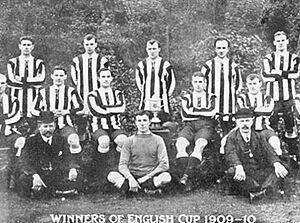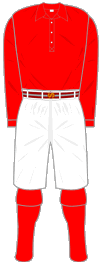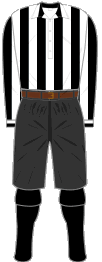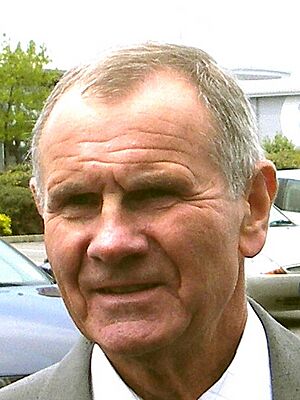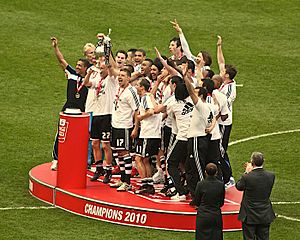History of Newcastle United F.C. facts for kids
Newcastle United Football Club is a professional football team from Newcastle upon Tyne, England. The club was formed in 1892 when two local teams, Newcastle East End and Newcastle West End, joined together to become 'United'. They joined the Football League in 1893.
Newcastle is one of England's most successful clubs. They have won the English championship four times (in 1905, 1907, 1909, and 1927). They have also won the FA Cup six times (in 1910, 1924, 1932, 1951, 1952, and 1955). Other trophies include the 1909 Charity Shield, the 1969 Inter-Cities Fairs Cup, and the 2006 Intertoto Cup. Newcastle has played in England's top league for many years, with some periods in the second division.
Contents
- How Newcastle United Began (1881–1895)
- The First Golden Age (1895–1914)
- Success Between the Wars (1919–1939)
- The War Years (1939–1946)
- Post-War Cup Wins (1946–1978)
- Moving Between Divisions (1978–1992)
- Into the Premier League (1992–2007)
- New Owners and Relegation (2007–2010)
- Back to the Premier League and Another Relegation (2010–2016)
- Championship Win and Premier League Return (2016–2021)
- New Ownership (2021–Present)
- Chairman History
- Owners History
- See also
How Newcastle United Began (1881–1895)
Football started in Newcastle in 1877. The club we know today, Newcastle United, began in November 1881 as the Stanley Cricket Club football team. They soon changed their name to Newcastle East End F.C. in October 1882.
Around the same time, another local club, Newcastle West End, also started playing football. In 1886, West End moved to play at St James' Park, which is still Newcastle United's home ground today. These two clubs became rivals.
In 1892, Newcastle West End ran into serious money problems. They decided to close down. Many of their players and staff joined Newcastle East End. East End also took over the lease for St. James' Park.
With only one main club in the city, fans had one team to support. To show that the two teams had joined together, Newcastle East End decided to change their name. On 9 December 1892, they chose the name Newcastle United. This name was officially accepted by the Football Association on 22 December. In 1893, Newcastle United joined the Football League's Second Division.
The First Golden Age (1895–1914)
At first, not many people came to watch the games. The club even said that the Newcastle public didn't "deserve" professional football! But by 1895–96, more fans started coming. In 1898, the team was promoted to the First Division, England's top league.
In the early 1900s, Newcastle United became a very strong team. They were known for their "artistic play," which meant they passed the ball quickly and worked well as a team. They bought many talented players, especially from Scotland. Players like Colin Veitch, Jackie Rutherford, and Albert Shepherd became famous.
Newcastle United won the League championship three times in this period: in 1905, 1907, and 1909. They also reached the FA Cup final five times before World War I. They finally won the FA Cup in 1910, beating Barnsley.
-
Playing against Aston Villa in the 1905 FA Cup final.
-
Playing against Woolwich Arsenal in a 1906 semi-final.
Success Between the Wars (1919–1939)
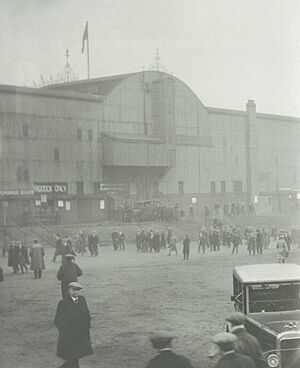
Newcastle United reached the FA Cup final again in 1924 at the new Wembley Stadium. They beat Aston Villa to win their second FA Cup. Three years later, in 1927, they won the First Division championship for the fourth time. A famous Scottish player named Hughie Gallacher, who scored many goals, was the captain of this championship team.
In 1930, the team almost got relegated. Hughie Gallacher left the club. In 1932, Newcastle won the FA Cup for the third time. This final was famous for a controversial goal. A cross from Jimmy Richardson seemed to go "over the line" (out of play) before the goal was scored, but the referee allowed it.
At the end of the 1933–34 season, Newcastle United was relegated to the Second Division after 32 years in the top league. The club struggled in the Second Division and almost got relegated even further in 1937–38.
The War Years (1939–1946)
When World War II started in 1939, football continued in a special "Wartime League." This period gave Newcastle a chance to rebuild their team. They brought in future stars like Jackie Milburn, Tommy Walker, and Bobby Cowell.
Jackie Milburn, who would become a club legend, made his debut in 1943. He scored 6 goals in one match, showing his amazing talent.
Post-War Cup Wins (1946–1978)
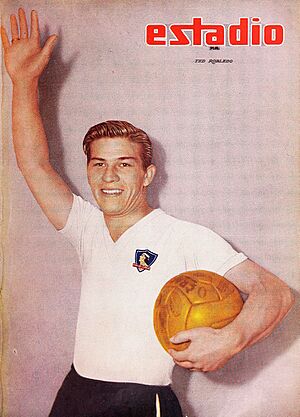
After the war, Newcastle United spent a couple of years in the Second Division. Fans were very excited for football to return, and huge crowds came to watch. In 1946, Newcastle had a record-breaking 13–0 win against Newport County. Len Shackleton scored 6 goals in that game!
In 1948, Newcastle was promoted back to the First Division. This was the start of another very successful period for the club.
In the 1950s, Newcastle United won the FA Cup three times in just five years. They beat Blackpool 2–0 in 1951, Arsenal 1–0 in 1952, and Manchester City 3–1 in 1955. Players like 'Wor Jackie' Milburn and Bobby Mitchell became famous across the country.
Despite having great players, Newcastle was relegated from the First Division in 1961. This was a big disappointment for the club.
However, a former player, Joe Harvey, returned to manage the team. He helped Newcastle get back to the top league in 1965 as Second Division Champions. In 1968, Joe Harvey's team qualified for European competition for the first time. The next year, they surprised everyone by winning the Inter-Cities Fairs Cup, which was a big European trophy. Key players at this time included Wyn Davies, Pop Robson, and Bobby Moncur.
After this European success, Harvey brought in exciting players like Malcolm Macdonald, nicknamed 'Supermac'. Macdonald was a fantastic goal scorer and a big hero for the fans. He led Newcastle to the FA Cup final in 1974, but they lost to Liverpool.
In 1975, Joe Harvey was sacked. Gordon Lee took over and led the club to its first League Cup final in 1976, but they lost to Manchester City. Macdonald was then sold, which upset many fans. Lee left in 1977, and the team struggled, eventually being relegated in 1978.
Moving Between Divisions (1978–1992)
After relegation, Bill McGarry managed the team for a while. Then, Arthur Cox took over and helped Newcastle return to the First Division. A huge moment was when former England captain Kevin Keegan joined the club in 1982.
Keegan's exciting football brought a lot of energy to Tyneside. Newcastle was promoted to the top division in style. Cox also signed young talents like Chris Waddle and Peter Beardsley. However, Cox resigned after the club's board wouldn't give him a better contract.
Later, players like Beardsley, Waddle, and Paul Gascoigne (nicknamed 'Gazza') were sold. This made fans unhappy and affected the team's performance. Newcastle was relegated back to the Second Division in 1989.
The club faced financial problems and arguments in the boardroom. Managers came and went, and the team struggled. By 1992, Newcastle was in serious debt and faced the risk of dropping to the third division for the first time. That's when John Hall became the new chairman and offered the manager's job to Kevin Keegan. Keegan, a club legend, accepted the challenge to save Newcastle from further relegation.
Into the Premier League (1992–2007)
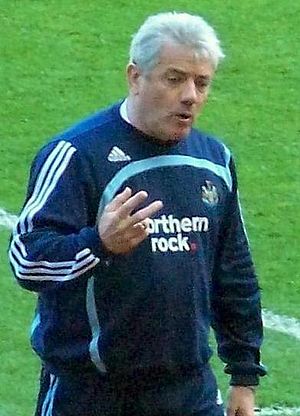
Kevin Keegan returned as manager in 1992 and successfully kept the club in the Second Division. With new money and players like Rob Lee and Andy Cole, Newcastle won the new First Division (now called the Championship) in 1993 and were promoted to the brand new Premier League.
During this time, St James' Park was rebuilt to hold more fans. Keegan's team became known for playing exciting, attacking football. In the 1995–96 season, with stars like David Ginola, Faustino Asprilla, Peter Beardsley, and Les Ferdinand, they finished second in the Premier League.
In 1996, Keegan made a huge signing, bringing Alan Shearer to the club for a world-record fee of £15 million. Shearer formed a great partnership with Les Ferdinand. Newcastle famously beat Manchester United 5–0 that season. However, Keegan resigned in January 1997, saying he had taken the club "as far as I can."
Kenny Dalglish took over and the club finished second again. But in the 1997–98 season, key players left, and Alan Shearer was injured. Dalglish's more cautious style of play didn't work as well. Newcastle finished 13th in the league and lost the FA Cup final.
Ruud Gullit then became manager, but the team still struggled, finishing 13th again and losing another FA Cup final. Gullit resigned in 1999 after disagreements with senior players like Alan Shearer.
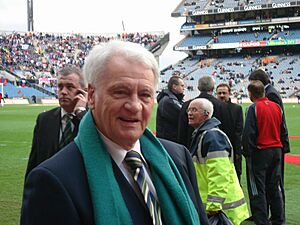
Former England manager Bobby Robson took charge in September 1999. He helped Newcastle avoid relegation and then built an exciting young squad. In 2001–02, they surprisingly finished fourth in the Premier League.
In 2002–03, Newcastle played in the UEFA Champions League, even beating Italian giants Juventus. They finished third in the Premier League that season. They also reached the semi-finals of the UEFA Cup in 2003–04. However, Robson was sacked in 2004 after a poor start to the season.
Graeme Souness replaced Robson. His time was difficult, with many injuries to key players. He signed Michael Owen for a club record £17 million, but Owen got injured. Souness was sacked in February 2006.
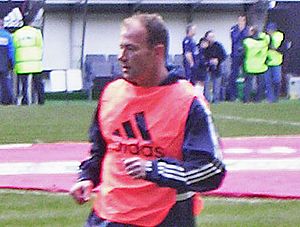
Caretaker manager Glenn Roeder took over. He guided Newcastle from 15th to seventh place, and Alan Shearer became the club's all-time top scorer with 201 goals. Shearer retired at the end of the 2005–06 season with 206 goals. Roeder's next season was tough due to many injuries, and he resigned in May 2007.
New Owners and Relegation (2007–2010)
In 2007, billionaire businessman Mike Ashley bought Newcastle United. He appointed Sam Allardyce as manager, but Allardyce was sacked halfway through his first season due to poor results.
Then, Kevin Keegan made a surprising return as manager. His return boosted ticket sales, but he had a difficult start. Keegan later had disagreements with the club's board, especially over player transfers. He felt he didn't have enough control. Keegan resigned in September 2008, which caused huge anger and protests from the fans.
After Keegan left, the club struggled to find a new manager. Mike Ashley even put the club up for sale. Joe Kinnear was appointed temporary manager, but he also faced criticism. Ashley later took the club off the market.
In the 2008–09 season, the team performed poorly. Alan Shearer returned as manager in April 2009, but he couldn't save the club. Newcastle was relegated to the Championship for the first time since 1992. Mike Ashley again said he wanted to sell the club.
A legal dispute between Kevin Keegan and the club was resolved. It was found that Keegan had been misled about who had the final say on transfers. He was awarded £2 million in compensation.
Back to the Premier League and Another Relegation (2010–2016)
Chris Hughton became the full-time manager for the 2009–10 season. The club dominated the Championship, winning 30 games and finishing top with 102 points. They were promoted back to the Premier League immediately.
However, in December 2010, the club controversially sacked Chris Hughton. Fans and players were shocked. Alan Pardew was then appointed manager. In January 2011, Newcastle sold striker Andy Carroll to Liverpool for a club record £35 million. This was controversial, as Carroll said he was forced to leave.
In the 2011–12 season, Pardew was reportedly not given the money from Carroll's sale for new players. Despite this, Newcastle signed many French-speaking players and had an impressive season, finishing fifth in the Premier League.
In 2012–13, Newcastle reached the quarter-finals of the UEFA Europa League. However, their league form was poor, and they finished 16th.
In 2013–14, Joe Kinnear returned as Director of Football, which caused more fan anger. He resigned after only eight months, having signed few players and sold key player Yohan Cabaye. Mike Ashley faced more protests from fans demanding he sell the club. Pardew was also banned for seven matches for an incident with an opposing player. The team finished 10th.
The 2014–15 season started poorly, but the team had a strong comeback, beating Manchester City in the League Cup. However, Pardew resigned in December 2014 due to pressure from fans. His assistant, John Carver, took over, but the team struggled and only avoided relegation on the final day of the season. Carver was then dismissed.
For the 2015–16 season, former England manager Steve McClaren was appointed. Despite signing several new players, McClaren struggled to get results and was sacked in March 2016. Rafael Benítez took over as manager. Benítez improved the team's form, but Newcastle was still relegated from the Premier League, finishing 18th.
Championship Win and Premier League Return (2016–2021)
For the 2016–17 season, Rafa Benítez signed many new players. The team had a strong season in the Championship, battling with Brighton & Hove Albion for the title. Newcastle won the Football League Championship trophy on the final day of the season, securing promotion back to the Premier League. Benítez confirmed he would stay with the club.
In the 2017–18 season, the club finished 10th in the Premier League, their highest finish in four years.
The 2018–19 season saw more fan frustration with Mike Ashley due to a lack of major new player signings. Despite signing Miguel Almirón for a club record fee, the team struggled and finished 13th. There was also much talk about whether Rafa Benítez would stay.
Benítez rejected a new contract and left the club on 30 June 2019. Mike Ashley said Benítez had made unfair demands. Key players like Salomón Rondón and Ayoze Perez also left.
Steve Bruce was then appointed manager in July 2019. His appointment was met with mixed reactions from fans. Bruce quickly made new signings, including Joelinton for a new club record fee of £40 million, and Allan Saint-Maximin. In February 2020, Bruce's team reached the 5th round of the FA Cup for the first time in 14 years.
From March 2020, the season was affected by the COVID-19 pandemic. Professional football in England was suspended and later restarted without fans. Newcastle finished the 2019–20 season in 13th place.
The 2020–21 season was also played mostly without fans. Newcastle finished 12th in the Premier League and had early exits from the FA Cup and League Cup.
New Ownership (2021–Present)
In April 2020, there were reports that a group of investors, including the Public Investment Fund of Saudi Arabia, were trying to buy Newcastle United. This proposed sale caused some debate. However, the group withdrew their offer in July 2020, saying the process had taken too long. Newcastle United later said the Premier League had officially rejected the takeover.
On October 7, 2021, the Public Investment Fund, along with PCP Capital Partners and RB Sports & Media, officially completed the purchase of Newcastle United. This meant the club had new owners.
Following the takeover, manager Steve Bruce left the club by mutual agreement. Eddie Howe was then appointed as the new manager on 8 November 2021. Howe had to miss his first game due to COVID-19.
Eddie Howe got his first win as manager on 4 December 2021. In the January transfer window, the new owners made several important signings, including Brazilian midfielder Bruno Guimarães. These new players and Howe's improvements helped Newcastle go on a great run, winning 9 games without defeat. They moved 10 points clear of the relegation zone and easily avoided being relegated. Newcastle finished 11th in the league, becoming the first team in Premier League history to avoid relegation after not winning any of their first 14 games.
In 2022, the club appointed Dan Ashworth as the new Sporting Director and Darren Eales as the new Chief Executive Officer.
Chairman History
As of 2021
Owners History
Newcastle United was set up as a company in 1895. For many years, a few families owned most of the shares. These included the McKeag, Rutherford, Seymour, and Westwood families.
In 1992, a group called The Magpie Group, led by Sir John Hall, took control of the club. In 2007, billionaire businessman Mike Ashley bought the club. Then, in 2021, the Public Investment Fund of Saudi Arabia, along with PCP Capital Partners and RB Sports & Media, became the new owners of the club.
| Name | Nat | From | To |
|---|---|---|---|
| Many small shareholders | 1895 | 1938 | |
| McKeag, Rutherford, Seymour and Westwood families | 1938 | 1992 | |
| Sir John Hall | 1992 | 2007 | |
| Mike Ashley | 2007 | 2021 | |
| Public Investment Fund | 2021 | present | |
| PCP Capital Partners | 2021 | present | |
| RB Sports & Media | 2021 | present |
See also
 In Spanish: Historia del Newcastle United para niños
In Spanish: Historia del Newcastle United para niños
- Newcastle United F.C. in Europe
 | Audre Lorde |
 | John Berry Meachum |
 | Ferdinand Lee Barnett |


